高一上学期英语人教新课标必修二Unit 2 The Olympic Games Grammar课件-(25张)
文档属性
| 名称 | 高一上学期英语人教新课标必修二Unit 2 The Olympic Games Grammar课件-(25张) |
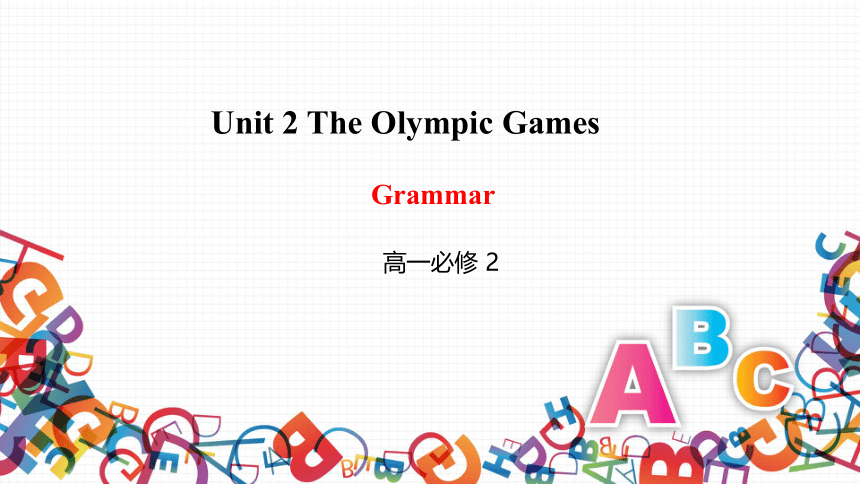
|
|
| 格式 | zip | ||
| 文件大小 | 1.7MB | ||
| 资源类型 | 教案 | ||
| 版本资源 | 人教版(新课程标准) | ||
| 科目 | 英语 | ||
| 更新时间 | 2021-07-14 00:00:00 | ||
图片预览

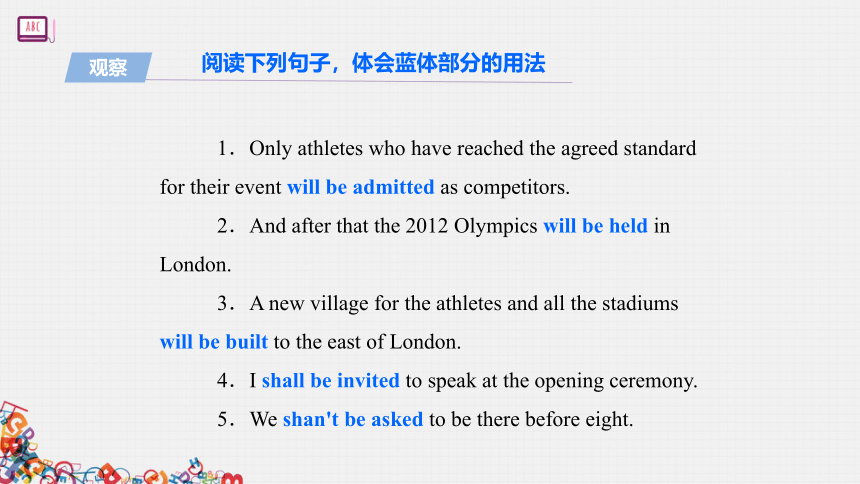
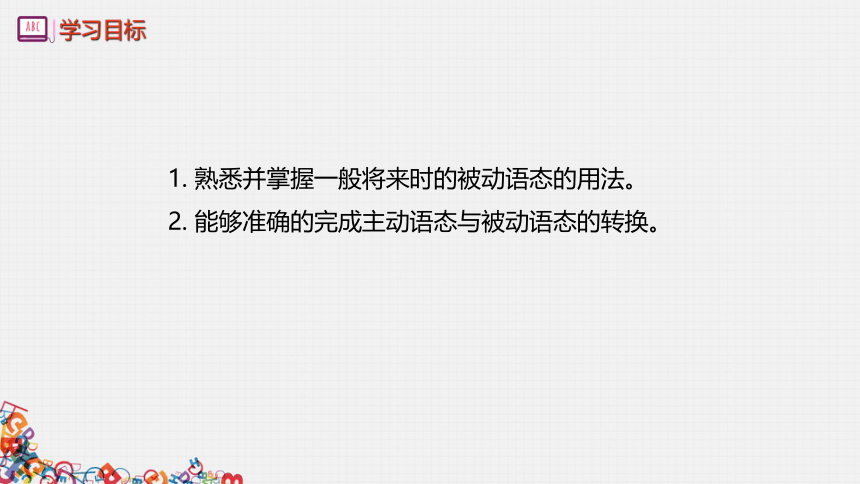
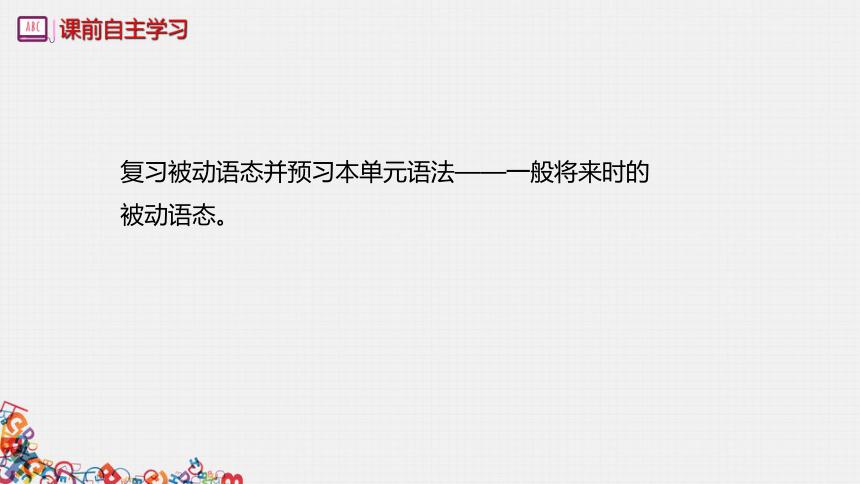

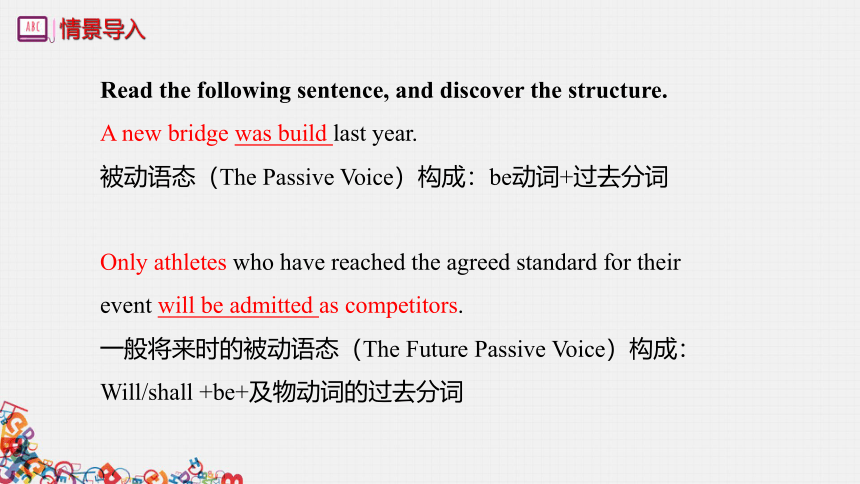
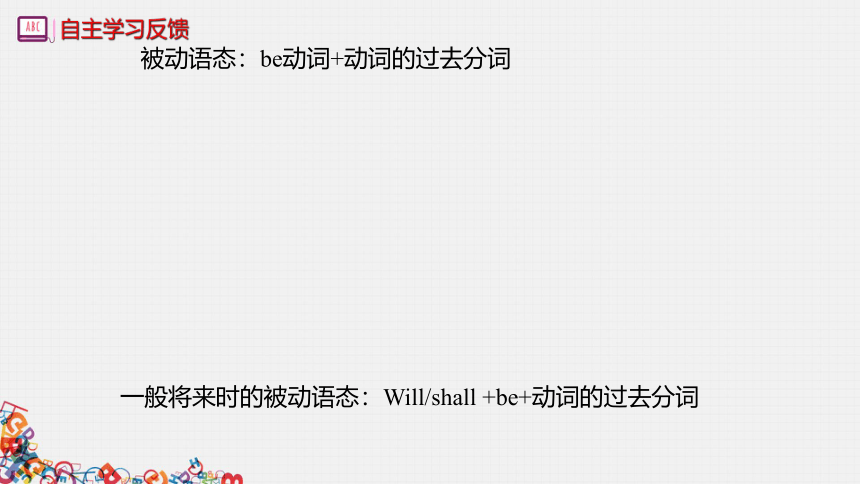
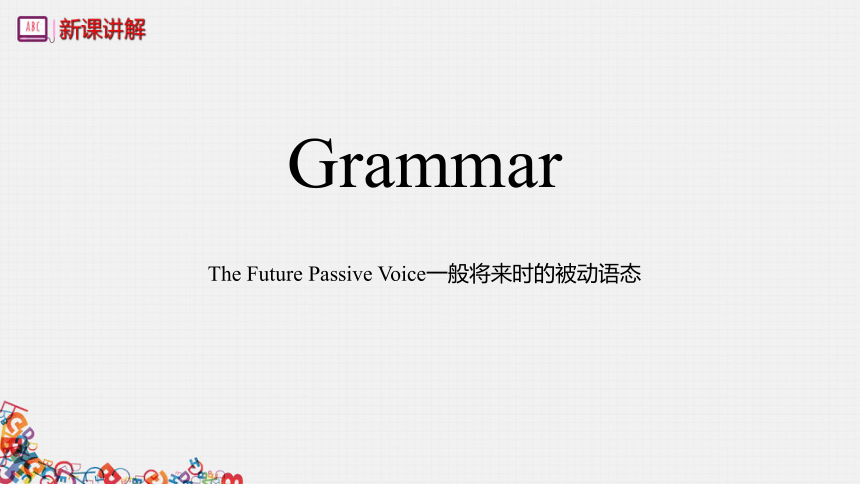

文档简介
(共25张PPT)
高一必修
2
Unit
2
The
Olympic
Games
Grammar
观察
阅读下列句子,体会蓝体部分的用法
1.Only
athletes
who
have
reached
the
agreed
standard
for
their
event
will
be
admitted
as
competitors.
2.And
after
that
the
2012
Olympics
will
be
held
in
London.
3.A
new
village
for
the
athletes
and
all
the
stadiums
will
be
built
to
the
east
of
London.
4.I
shall
be
invited
to
speak
at
the
opening
ceremony.
5.We
shan't
be
asked
to
be
there
before
eight.
学习目标
1.
熟悉并掌握一般将来时的被动语态的用法。
2.
能够准确的完成主动语态与被动语态的转换。
课前自主学习
复习被动语态并预习本单元语法——一般将来时的被动语态。
一般将来时的被动语态
情景导入
Read
the
following
sentence,
and
discover
the
structure.
A
new
bridge
was
build
last
year.
被动语态(The
Passive
Voice)构成:be动词+过去分词
Only
athletes
who
have
reached
the
agreed
standard
for
their
event
will
be
admitted
as
competitors.
一般将来时的被动语态(The
Future
Passive
Voice)构成:Will/shall
+be+及物动词的过去分词
自主学习反馈
被动语态:be动词+动词的过去分词
被动语态
肯定句:主语+be+动词的过去分词
Money
is
used
to
buy
useful
things.
否定句:主语+be
not+动词的过去分词
Money
is
not
used
to
buy
useful
things.
一般疑问句:Be+主语+动词的过去分词
Is
money
used
to
buy
useful
things?
特殊疑问句:疑问词+be+主语+动词的过去分词
What
is
money
used
to
do?
一般将来时的被动语态:Will/shall
+be+动词的过去分词
新课讲解
Grammar
The
Future
Passive
Voice一般将来时的被动语态
新课讲解
The
Future
Passive
Voice一般将来时的被动语态
动作发生在将来
强调动作的承受着,或不能或无须提及动作的执行者
常有未来时间状语作时态标志
一般将来时的被动语态
一、基本用法
时态
一般将来时的被动语态在各种句式中的用法如下:
1.肯定式:shall/will+be+过去分词
The
stadium
will
be
finished
soon.
体育馆很快就会竣工。
2.否定式:won't/shan't+be+过去分词
He
will
not
be
punished
for
it.
他将不会为此受到惩罚。
时态
3.一般疑问式:will/shall+主语+be+过去分词
Will
the
house
be
painted
again
next
month?
下个月这所房子将重新粉刷吗?
4.特殊疑问式:特殊疑问词+shall/will+主语+be+过去分词+其他
Where
will
the
cinema
be
built?
将在哪里建电影院呢?
一、基本用法
时态
1.be
to
be
done
(1)表示按计划或安排将要发生的被动动作。
The
novel
is
to
be
published
next
year.
这本小说将在明年出版。
(2)表示“应该”,意思相当于should,可用来征求对方意见。
What
is
to
be
done
next?下一步该怎么办呢?
(3)表示“必须”,意思相当于must
或
have
to。
Your
paper
is
to
be
handed
in
before
Thursday.
你的论文要在星期四之前上交。
二、其他表示将来的被动语态形式
时态
2.be
going
to
be
done
常用来表示按计划或安排将要发生的被动动作。
The
old
library
is
going
to
be
pulled
down
tomorrow.
这座旧图书馆明天将被拆除。
二、其他表示将来的被动语态形式
时态
3.will/shall
get+过去分词
表示一种动作,有时用来表示意想不到的、突然的或偶然发生的情况。多用于口语。
The
machine
will
get
repaired
by
him.
他会修理这台机器的。
二、其他表示将来的被动语态形式
时态
4.am/is/are
about
to
be
done表示立即或马上就要发生的被动动作。
The
polluted
water
is
about
to
be
cleaned.
被污染的水即将被净化。
二、其他表示将来的被动语态形式
时态
5.am/is/are
done用于状语从句中表示将来要发生或完成的被动动作。
When
our
classroom
is
decorated,it
will
be
more
beautiful.
当我们的教室被装修完毕时,它一定会更加漂亮。
二、其他表示将来的被动语态形式
时态
1.在时间、条件状语从句中,应使用现在时的被动语态表示将来的被动动作。
He
says
he
will
leave
the
company
if
he
is
punished
for
this.
他说如果因为这件事而受到惩罚,他将离开公司。
2.动词短语变被动语态时不能漏掉介词或副词。
The
little
girl
will
be
taken
care
of
by
the
old
man.
这个小女孩将由这个老人照顾。
三、应注意的几个问题
时态
3.含有双宾语的主动句变为被动语态时,应根据需要将其中的一个宾语变成被动句的主语,另一个宾语保留不变。
My
mother
will
give
me
a
shirt
as
a
birthday
present.
→I
will
be
given
a
shirt(by
my
mother)as
a
birthday
present.
我的妈妈将给我一件衬衣作为生日礼物。
三、应注意的几个问题
新课讲解
We
will
learn
a
new
lesson.
A
new
lesson
will
be
learnt
by
us.
新课讲解
1.一般将来时的被动语态的否定形式
主语+will/shall
+be+动词的过去分词.
The
party
will
be
held
in
the
house.
主语+will/shall
+be
not+动词的过去分词.
The
party
will
not
be
held
in
the
house.
新课讲解
2.一般将来时的被动语态的一般疑问句形式
主语+will/shall
+be+动词的过去分词.
The
party
will
be
held
in
the
house.
Will/shall+主语+be
+动词的过去分词?
Will
the
party
be
held
in
the
house?
新课讲解
3.一般将来时的被动语态的特殊疑问句形式
主语+will/shall
+be+动词的过去分词.
The
party
will
be
held
in
the
house.
疑问词+will/shall+主语+be
+动词的过去分词?
When
will
the
party
be
held
in
the
house?
课堂活动
Make
sentences
with
the
future
Passive
Voice
and
share
your
sentences
with
your
partner.
课堂小结
高一必修
2
Unit
2
The
Olympic
Games
Grammar
观察
阅读下列句子,体会蓝体部分的用法
1.Only
athletes
who
have
reached
the
agreed
standard
for
their
event
will
be
admitted
as
competitors.
2.And
after
that
the
2012
Olympics
will
be
held
in
London.
3.A
new
village
for
the
athletes
and
all
the
stadiums
will
be
built
to
the
east
of
London.
4.I
shall
be
invited
to
speak
at
the
opening
ceremony.
5.We
shan't
be
asked
to
be
there
before
eight.
学习目标
1.
熟悉并掌握一般将来时的被动语态的用法。
2.
能够准确的完成主动语态与被动语态的转换。
课前自主学习
复习被动语态并预习本单元语法——一般将来时的被动语态。
一般将来时的被动语态
情景导入
Read
the
following
sentence,
and
discover
the
structure.
A
new
bridge
was
build
last
year.
被动语态(The
Passive
Voice)构成:be动词+过去分词
Only
athletes
who
have
reached
the
agreed
standard
for
their
event
will
be
admitted
as
competitors.
一般将来时的被动语态(The
Future
Passive
Voice)构成:Will/shall
+be+及物动词的过去分词
自主学习反馈
被动语态:be动词+动词的过去分词
被动语态
肯定句:主语+be+动词的过去分词
Money
is
used
to
buy
useful
things.
否定句:主语+be
not+动词的过去分词
Money
is
not
used
to
buy
useful
things.
一般疑问句:Be+主语+动词的过去分词
Is
money
used
to
buy
useful
things?
特殊疑问句:疑问词+be+主语+动词的过去分词
What
is
money
used
to
do?
一般将来时的被动语态:Will/shall
+be+动词的过去分词
新课讲解
Grammar
The
Future
Passive
Voice一般将来时的被动语态
新课讲解
The
Future
Passive
Voice一般将来时的被动语态
动作发生在将来
强调动作的承受着,或不能或无须提及动作的执行者
常有未来时间状语作时态标志
一般将来时的被动语态
一、基本用法
时态
一般将来时的被动语态在各种句式中的用法如下:
1.肯定式:shall/will+be+过去分词
The
stadium
will
be
finished
soon.
体育馆很快就会竣工。
2.否定式:won't/shan't+be+过去分词
He
will
not
be
punished
for
it.
他将不会为此受到惩罚。
时态
3.一般疑问式:will/shall+主语+be+过去分词
Will
the
house
be
painted
again
next
month?
下个月这所房子将重新粉刷吗?
4.特殊疑问式:特殊疑问词+shall/will+主语+be+过去分词+其他
Where
will
the
cinema
be
built?
将在哪里建电影院呢?
一、基本用法
时态
1.be
to
be
done
(1)表示按计划或安排将要发生的被动动作。
The
novel
is
to
be
published
next
year.
这本小说将在明年出版。
(2)表示“应该”,意思相当于should,可用来征求对方意见。
What
is
to
be
done
next?下一步该怎么办呢?
(3)表示“必须”,意思相当于must
或
have
to。
Your
paper
is
to
be
handed
in
before
Thursday.
你的论文要在星期四之前上交。
二、其他表示将来的被动语态形式
时态
2.be
going
to
be
done
常用来表示按计划或安排将要发生的被动动作。
The
old
library
is
going
to
be
pulled
down
tomorrow.
这座旧图书馆明天将被拆除。
二、其他表示将来的被动语态形式
时态
3.will/shall
get+过去分词
表示一种动作,有时用来表示意想不到的、突然的或偶然发生的情况。多用于口语。
The
machine
will
get
repaired
by
him.
他会修理这台机器的。
二、其他表示将来的被动语态形式
时态
4.am/is/are
about
to
be
done表示立即或马上就要发生的被动动作。
The
polluted
water
is
about
to
be
cleaned.
被污染的水即将被净化。
二、其他表示将来的被动语态形式
时态
5.am/is/are
done用于状语从句中表示将来要发生或完成的被动动作。
When
our
classroom
is
decorated,it
will
be
more
beautiful.
当我们的教室被装修完毕时,它一定会更加漂亮。
二、其他表示将来的被动语态形式
时态
1.在时间、条件状语从句中,应使用现在时的被动语态表示将来的被动动作。
He
says
he
will
leave
the
company
if
he
is
punished
for
this.
他说如果因为这件事而受到惩罚,他将离开公司。
2.动词短语变被动语态时不能漏掉介词或副词。
The
little
girl
will
be
taken
care
of
by
the
old
man.
这个小女孩将由这个老人照顾。
三、应注意的几个问题
时态
3.含有双宾语的主动句变为被动语态时,应根据需要将其中的一个宾语变成被动句的主语,另一个宾语保留不变。
My
mother
will
give
me
a
shirt
as
a
birthday
present.
→I
will
be
given
a
shirt(by
my
mother)as
a
birthday
present.
我的妈妈将给我一件衬衣作为生日礼物。
三、应注意的几个问题
新课讲解
We
will
learn
a
new
lesson.
A
new
lesson
will
be
learnt
by
us.
新课讲解
1.一般将来时的被动语态的否定形式
主语+will/shall
+be+动词的过去分词.
The
party
will
be
held
in
the
house.
主语+will/shall
+be
not+动词的过去分词.
The
party
will
not
be
held
in
the
house.
新课讲解
2.一般将来时的被动语态的一般疑问句形式
主语+will/shall
+be+动词的过去分词.
The
party
will
be
held
in
the
house.
Will/shall+主语+be
+动词的过去分词?
Will
the
party
be
held
in
the
house?
新课讲解
3.一般将来时的被动语态的特殊疑问句形式
主语+will/shall
+be+动词的过去分词.
The
party
will
be
held
in
the
house.
疑问词+will/shall+主语+be
+动词的过去分词?
When
will
the
party
be
held
in
the
house?
课堂活动
Make
sentences
with
the
future
Passive
Voice
and
share
your
sentences
with
your
partner.
课堂小结
